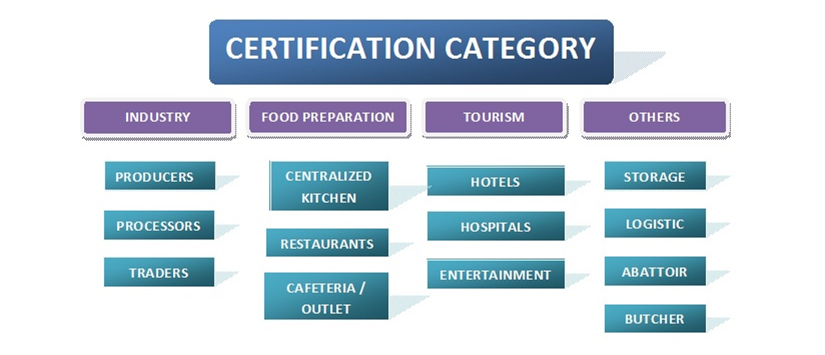Standard
Halal CertificationHALAL Certification
What is HALAL?
HALAL is an Arabi word meaning “lawful” or say permissible as per Islamic law (Shariah). HALAL is particularly associated with Islamic dietary laws. The opposite of HALAL is Haram which means unlawful or prohibited. The words HALAL and haram are the usual terms used in the holy Quran to designate the categories of lawful or allowed and unlawful or forbidden. Muslims must also ensure that foods (particularly processed foods), as well as non-food items like cosmetics and pharmaceuticals, are HALAL. Frequently, these products contain animal by-products or other ingredients that are not permissible for Muslims to eat or use on their bodies. Foods which are not considered HALAL for Muslims to consume include blood and intoxicants such as alcoholic beverages.
What is HALAL Certification ?
HALAL Certification is a recognition that the products are premissible under Islamic law. These products are thus edible, drinkable or usable by Muslims.
Why HALAL certification for Vegetarian foods?
The word HALAL means “proper and permitted.” HALAL food is permitted by Allah (God) for Muslim consumption and includes all fruits, vegetables and grains. This was all the definition required for followers of Islam before the growth of processed foods.
The processing of foods makes many formerly “vegetarian” meals, breads, yogurts or cereals no longer considered HALAL Ingredients used in processed foods may contain hidden haram (Forbidden) components for example, these may be in colors, flavors or processing aids, as well as in sub-ingredients used. Many vegetarian-type items do not meet HALAL standards for example, cheese, marshmallows, candies, baked goods and yogurt may have enzyme and gelatin ingredients from animals which are not HALAL.
Many non-Muslims incorrectly believe that HALAL certification means nothing more than having a Muslim bless the plant and declare that the products are now HALAL. Some producers mistakenly believe that by not adding pork or any animal extract or alcohol ingredients, they can “self-certify” and label the product as HALAL for export or domestic sale.
HALAL For Whom
A HALAL certificate is relevant for manufacturers, packers and/or traders of products which includes food, cosmetic, flavor, fragnance, pharmaceuticals, Nutraceuticals, AYUSH, toiletries, chemicals, agri- products, etc. Catering companies or companies preparing food like centralized kitchens, restaurant, eating outlet, kiosk, etc can also be HALAL certified to ensure consumer to get HALAL food. Under tourism category we certify hotels, hospitals, resort, entertainment area, amusement park, etc as HALAL based on services and food they provide. For tourism category we provide two certificates one for service and another for food they serve wherever applicable. For companies involved in supply chain we provide certificate for logistic/transportation and and storage/warehouse business. This will help ensure HALAL compliance of product throughout the supply chain ensuring a total HALAL food reaches the consumers.

Benefits of HALAL Certification
HALAL is a multi trillion dollar market and is still increasing exponentially. Due to globalization there is a free flow of goods across the borders. But not all products suitable for every region or nation hence the Islamic nations require HALAL certificate for the products being imported into their countries. Regions like Gulf and South East Asia are the few of the largest market for Indian made products. To gain entry into these markets it is essential to have HALAL certificate especially for food products but soon it will be mandatory for all products. Since these markets are dominated by Muslim consumer, a HALAL logo on your product will help to promote and market your product more thus building a strong brand value for your product. There are countries as well there is a demand for HALAL products for example Europe, Africa, India, Bangladesh, US, etc..
- Opportunities to tap a global HALAL food market of about 2 billion people (Middle east, Asia Pacific, EU, USA, LATAM, Central Asia)
- HALAL logo is an authoritative, independent and reliable testimony to support HALAL food claims
- 200% profit of greater market share: No loss of non-Muslim markets/clients
- Enhance marketability of products in Muslim countries/markets
- Small cost investment relative to multiple growth in revenues
- Image boosts in meeting varied customer needs.
- Improve the food preparation hygienic system
- Improve the food quality into global standards
